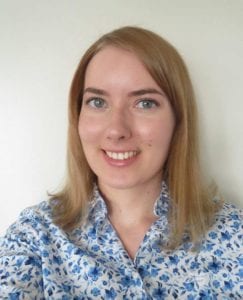
Trainee Author: Johanna Känsäkoski
PhD student
University of Helsinki
(Photo courtesy Känsäkoski)
This paper highlights the use of sequencing technology to identify causative mutations in patients with a normal androgen receptor gene coding region. Känsäkoski et al. identify a novel intronic mutation that is associated with complete androgen insensitivity syndrome. They describe a case of sisters in whom the disorder is caused by a deep intronic mutation resulting in aberrant splicing through pseudoexon activation. This mechanism could be followed up in other cases of complete androgen insensitivity syndrome where no coding or splice junction variants have been found.
ASHG: Could you describe your research for us?
Ms. Känsäkoski: I study genetic defects underlying rare disorders of growth and puberty by employing whole-exome and whole-genome sequencing methods as well as functional studies. More specifically, my research during the past few years has focused on the molecular genetics of both precocious puberty and congenital hypogonadotropic hypogonadism, a rare disorder characterized by absent, partial, or severely delayed puberty.
I also study genetic defects underlying disorders of sex development, such as complete androgen insensitivity syndrome, which can also lead to atypical pubertal development.
ASHG: What are your career goals?
Ms. Känsäkoski: My current goal is to obtain my PhD degree in a few months. After that, I want to continue my genetics training by studying the molecular genetics of human disorders. In the future, I would like to work in a clinical molecular genetics laboratory.
ASHG: Why did you choose genetics as your field of study?
Ms. Känsäkoski: I have long been fascinated by how genes play such a huge part in who we are, and how a tiny mistake in the genetic code can sometimes have such devastating consequences. To me, genetics is most rewarding when I can identify that mistake and, in that way, do my part to help the affected individuals and their family members.
ASHG: Describe yourself in three words.
Ms. Känsäkoski: Detail-oriented, Persistent, Thoughtful.
The Trainee Paper Spotlight highlights outstanding papers written by trainee members of ASHG. Submit your science to be featured, and join the ASHG Trainee Forum to keep up with new ones.
